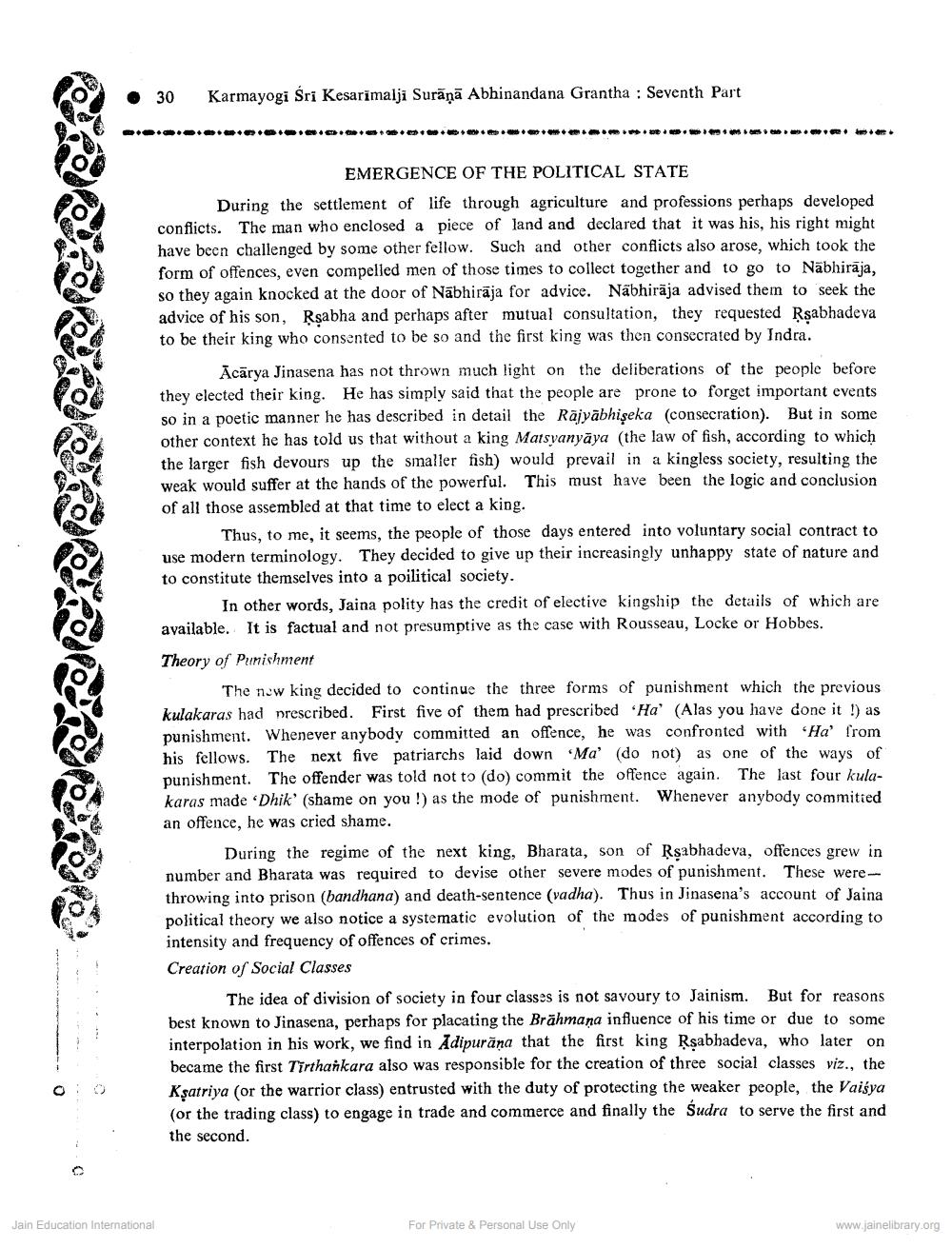________________
•
30
Karmayogi Śri Kesarimalji Surāņā Abhinandana Grantha : Seventh Part
EMERGENCE OF THE POLITICAL STATE During the settlement of life through agriculture and professions perhaps developed conflicts. The man who enclosed a piece of land and declared that it was his, his right might have been challenged by some other fellow. Such and other conflicts also arose, which took the form of offences, even compelled men of those times to collect together and to go to Nābhiraja, so they again knocked at the door of Nābhirāja for advice. Nabhiräja advised them to seek the advice of his son, Rsabha and perhaps after mutual consultation, they requested Rsabhadeva to be their king who consented to be so and the first king was then consecrated by Indra.
SONO
POU
Ācārya Jinasena has not thrown much light on the deliberations of the people before they elected their king. He has simply said that the people are prone to forget important events so in a poetic manner he has described in detail the Rajyabhiseka (consecration). But in some other context he has told us that without a king Matsyanyāya (the law of fish, according to which the larger fish devours up the smaller fish) would prevail in a kingless society, resulting the weak would suffer at the hands of the powerful. This must have been the logic and conclusion of all those assembled at that time to elect a king.
Thus, to me, it seems, the people of those days entered into voluntary social contract to use modern terminology. They decided to give up their increasingly unhappy state of nature and to constitute themselves into a poilitical society.
In other words, Jaina polity has the credit of elective kingship the details of which are available. It is factual and not presumptive as the case with Rousseau, Locke or Hobbes. Theory of Punishment
The new king decided to continue the three forms of punishment which the previous kulakaras had prescribed. First five of them had prescribed Ha' (Alas you have done it !) as punishment. Whenever anybody committed an offence, he was confronted with Ha' from his fellows. The next five patriarchs laid down 'Ma' (do not) as one of the ways of punishment. The offender was told not to (do) commit the offence again. The last four kulakaras made 'Dhik' (shame on you !) as the mode of punishment. Whenever anybody committed an offence, he was cried shame.
During the regime of the next king, Bharata, son of Rşabhadeva, offences grew in number and Bharata was required to devise other severe modes of punishment. These were throwing into prison (bandhana) and death-sentence (vadha). Thus in Jinasena's account of Jaina political theory we also notice a systematic evolution of the modes of punishment according to intensity and frequency of offences of crimes. Creation of Social Classes
The idea of division of society in four classes is not savoury to Jainism. But for reasons best known to Jinasena, perhaps for placating the Brāhmaṇa influence of his time or due to some interpolation in his work, we find in Adipurāna that the first king Rsabhadeva, who later on became the first Tirthankara also was responsible for the creation of three social classes viz., the Kşatriya (or the warrior class) entrusted with the duty of protecting the weaker people, the Vaisya (or the trading class) to engage in trade and commerce and finally the Sudra to serve the first and the second
3
O
ey
VAS
Jain Education International
For Private & Personal Use Only
www.jainelibrary.org




